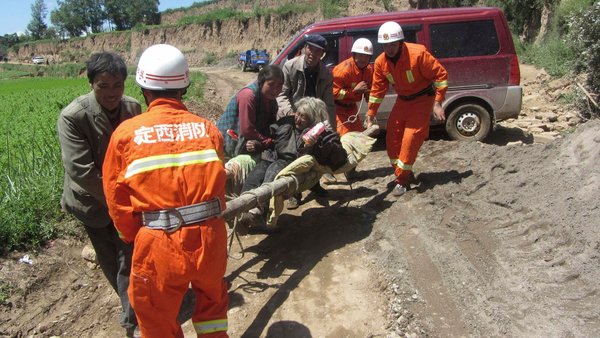The Gansu Provincial Seismological Bureau estimated the magnitude of the main earthquake at 6.6. The United States Geological Survey listed three fairly strong earthquakes in Gansu Province on Monday morning but none quite that powerful, with preliminary magnitudes of 5.9, 5.6 and 4.7.
The quakes took place along the border between Minxian County and Zhangxian County, both in the south of Gansu Province. Most of the deaths and injuries occurred in Minxian County, and all of the missing were there.
At the Lee Yuan Hotel in Minxian County, a woman who identified herself as Ms. Zhao said she had been terrified when the building shook and the ceiling lights swayed. She reached her mother by phone in their home village later in the morning, and was relieved to learn that she had survived unscathed.
“She and all our neighbors ran out of their homes right away when they felt the first quake hit — a lot of the village homes were destroyed by the earthquakes,” Ms. Zhao said by telephone.
Stung by criticisms that they responded too slowly in 2008 to a massive earthquake in adjacent Sichuan Province and to several nearby earthquakes after that, Chinese officials and government organizations made a point of rushing to Gansu Province. The seismological bureau said in the late afternoon that both of the province’s top officials — the Communist Party chief, Wang Yun, and Gov. Liu Weiping — had arrived in the disaster area, as had 35,000 police officers, firefighters and rescue workers. An additional 8,500 workers were sent to repair and reopen roads and highways.
The earthquake-affected area lies about 140 miles south of Lanzhou, which is not only the provincial capital but also the headquarters of an important Chinese regional military command. That command sent 1,322 active-duty soldiers and 1,428 members of militia and reserve units, the provincial seismological bureau said in a statement on its Web site.
In addition to President Xi’s authorization of all-out rescue efforts, Prime Minister Li Keqiang authorized emergency response measures and sent rescue teams, Xinhua reported.
The participation of both leaders was significant. One criticism in China in 2008 was that when Prime Minister Wen Jiabao rushed to Sichuan and saw the extent of the damage, he was unable to approve the immediate mobilization of nearby military units because, unlike President Hu Jintao then and Mr. Xi now, he did not run the Central Military Commission, which oversees the People’s Liberation Army.
Provincial weather officials were forecasting thunderstorms and nearly certain rain in the area Monday evening, conditions that could complicate the rescue of survivors.
The 2008 earthquake in Sichuan Province was initially reported as having killed a half-dozen people, but the final figure reached 87,000. That earthquake was far more powerful, however, with a magnitude of 7.9, meaning that the Sichuan earthquake had 100 times the force of the initial United States estimate for the most powerful of the three earthquakes Monday.
One of the biggest issues after the 2008 earthquake lay in the substandard construction of many schools and other buildings that collapsed, and there were allegations that developers had cut corners in collusion with local officials. Gansu is one of the poorest provinces in China, with many older buildings of simple construction.

